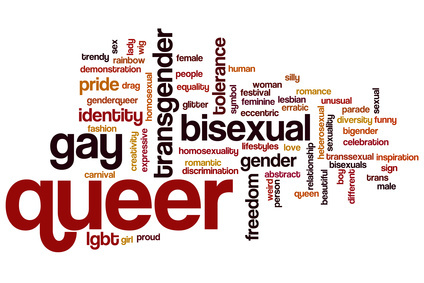While I've never been anti-LGBT, I can honestly say that before I went to prison, it was a world I was utterly clueless about. If I'm completely honest, I didn't even know that transgender people actually existed. I don't say that to be disrespectful but to show how ignorant I was, and as a point of pride to show how far I've come.
My own introduction to LGBT culture came in the form of a friend, whom I eventually became cellmates with. Her name is Sangye Rinchen, and she's a transgender woman. Incarcerated for unarmed bank robbery, and perhaps even more of a "solid convict" than I was (she's Boston-born, after all), Sangye taught me virtually everything that I know about transgender issues and, in particular, the concerns and struggles of those who are incarcerated. When I was asked to learn about the issues at hand and help in the litigation struggle -- one that has centered on the case of Ashley Arnold -- I became an ardent supporter of their cause.
When it comes to transgender inmates in transition, official Federal Bureau of Prisons policy is to maintain the hormone levels from prior to incarceration. But exactly how this policy is implemented in practice is a whole other matter. Again, had I not had the privilege of getting to know members of the LGBT community in FCI Petersberg, I would never have been aware of how badly overlooked their medical needs have been. Despite the Bureau's "policy," it's taken dedicated work to ensure that these treatments are actually available. I've worked alongside transgender inmates to force administrators to provide androgen blockers and estrogen (via patch and injection), all essential parts of treatment.
For many people, the day Chelsea Manning announced that she identifies as a woman and would be transitioning was the first time they ever thought about life as an incarcerated transgender person (Orange Is the New Black has helped along those lines) and the specific medical issues it involves. But while talking about transgender issues openly may seem like a relatively recent thing, medical protocols for transgender health have been around since 1979. So what we're pushing for here is simply for the Federal Bureau of Prisons to adhere to the Standards of Care that were adopted almost 40 years ago and have been reaffirmed by the World Professional Association for Transgender Health.
What many on the outside looking in don't realize is that this isn't about "special" treatment. For people with gender dysphoria (a diagnosis recognized in the DSM-V), physiological and psychological treatment is medically necessary. These things are not optional, but even so it's been a battle to make them available in prisons. We have pushed administrators to provide inmates with bras (though not frilly ones, much to the dismay of some) -- something that anyone following the Ashley Arnold case knows is no small feat. And inmates now have improved access to counseling. However, there are a number of mental-health aspects to the picture that are ignored by officials, and we're pushing for more novel therapies: hair-removal options, vocal training, female underwear, and ultimately sex reassignment therapy. The mental-health component of the issue can't be understated.
Prison is not a very nice place. This is especially true for those who don't conform to the traditional image of a convict. Those who are lesbian, gay, bisexual, transgender, or even just effeminate do not have a very good time. And while none of us expect prison to be "fun," they face especially dangerous situations with potentially permanent consequences. Transgender inmates face a much greater risk of sexual assault and are frequent victims of harassment from both inmates and staff. Staff will often refuse to use the correct pronouns when referring to an inmate (using "he" instead of "she") or may berate others for employing the correct ones, and medical staff may sexually intimidate transgender prisoners who come to them for assistance. Sadly we have witnessed both types of incidents at FCI Petersburg.
It is not only transgender inmates who face social stigmatization while incarcerated, either. It is not always easy to support LGBT persons in the prison environment. As an ally I've lost friends over my involvement. I certainly lost the respect of certain hardline groups in the compound, and this weighs on me as part of the broader prison community. But I have also gained the respect and trust of the LGBT community here at FCI Petersburg, and this I place at a much higher value, both socially and morally. I'm a man of principles, even when these principles cut against me.
As the battle for LGBT rights has waged on at FCI Petersburg, the attacks have become more personal, and the tactics increasingly underhanded. Outside of prison staff reading all incoming and outgoing postal mail (SIS technicians now monitor all of my communications), they have also started to do the same to inbound privileged legal correspondence, in an apparent effort to understand my litigation strategy against them for their conspiracy to deprive me of my First Amendment rights. But for me and other LGBT allies at FCI Petersburg (and there are many among staff and inmates), we'll continue to fight the good fight regardless of how painful it might become. It's a matter of principle, a matter of humanity, and it's simply what needs to be done.

